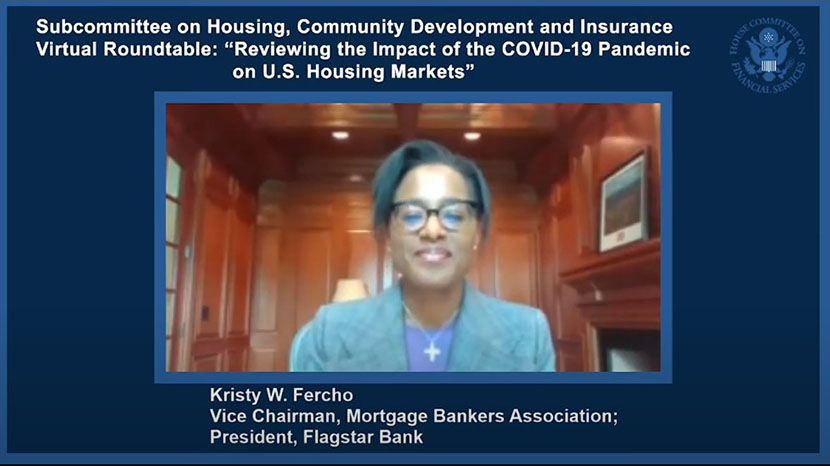
MBA Vice Chair Kristy Fercho Testifies Before House Subcommittee on Industry’s COVID-19 Response

Mortgage Bankers Association Vice Chair Kristy Fercho testified Friday before a House subcommittee on the real estate finance industry’s response to the coronavirus pandemic, saying mortgage servicers adapted to changing customer needs quickly and asking Congress to give the industry additional flexibility to address evolving market conditions.
Fercho, President of Mortgage with Flagstar Bank, Troy, Mich., appeared before the House Financial Services subcommittee on Housing, Community Development and Insurance in a virtual roundtable on “Reviewing the Impact of the COVID-19 Pandemic on U.S. Housing Markets.” The virtual roundtable was one of the first efforts by the House to conduct business from multiple remote locations.
Fercho noted mortgage servicers have played an “integral role” in providing an unprecedented amount of payment relief to our customers, as appropriately mandated by the CARES Act, “all the while, managing in real time, high-touch operations remotely. In fact, MBA members have pivoted quickly to digital processes and interaction to ensure that American households can enjoy access to mortgage markets during this time of social distancing,” she said.
Fercho said since the beginning of March, MBA members have provided mortgage forbearance to more than four million customers. Loans in forbearance grew from just a quarter-percent of the loans serviced to now more than 8 percent.
“In just six weeks, mortgage servicers have been able to cut the average wait time from a high of 13 minutes to two minutes, and the abandonment rate from a high of 21 percent to just 5 percent,” Fercho said. “These numbers are emblematic of the industry’s efforst to adjust to this new normal, and an extremely quick pace, ensuring that our customers are well-served, despite these unfortunate circumstances.”
Fercho said as lawmakers consider further measures, it’s important that these procedures provide servicers with operational flexibility necessary to address customers’ unique financial circumstances.
“Every disaster or emergency requires a unique response,” Fercho said. “Preserving servicer, investor and guarantor flexibility to develop solutions in real time ensures that the residential, the rental property and the commercial borrowers receive the most appropriate outcomes.”
The subcommittee, chaired by Rep. William Lacy Clay, D-Mo., with Ranking Member Steve Stivers, R-Ohio, also heard testimony from Jenny Scheutz, Fellow with the Brookings Institution; and Dianne Yentel, President and CEO of the National Low Income Housing Coalition.
In response to concerns expressed by Clay about how the Federal Housing Finance Agency is moving to end the conservatorships of Fannie Mae and Freddie Mac, Fercho, who spent 15 years with Fannie Mae, said she “appreciated the desire of FHFA and the GSEs to get out of conservatorship. She said in order for the GSEs to get out of conservatorship and ultimate exit, a “strong and credible capital framework” must be established that allows the GSEs to support credit liquidity throughout credit cycles.
“It is equally important that we lock in any of the key reforms over the last decade, such as fair pricing; such as market access for lenders of all sizes,” Fercho said. “Those steps and leveling the playing field to ensure continued access to liquidity has been very useful, and only after those steps have been completed should the GSEs be permitted to exit conservatorship.”
The entire virtual roundtable can be viewed at https://www.youtube.com/watch?v=Ud-BmrDjDyg.
